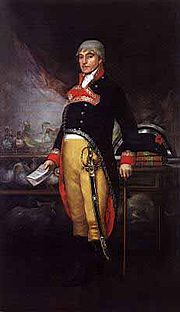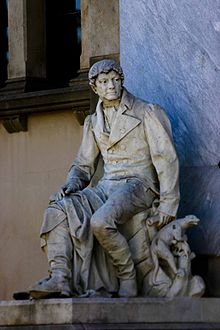- Félix de Azara
-
Félix Manuel de Azara (18 May 1742 – 20 October 1821[1]) was a Spanish military officer, naturalist and engineer. He was born in Barbunales, Aragon.
He first embraced a military career as an engineer, and distinguished himself in various expeditions, and rose to the rank of Brigadier General in the Spanish Army.
Azara was sent to South America in 1781 to settle the question of borders between the Portuguese and Spanish colonies. He remained until 1801. Before leaving South America, he sent his brother (then Spanish Ambassador at Paris) many notes and observations of a zoological nature, which Moreau de Saint-Méry published at Paris in 1801 under the title of "Essai sur l'histoire naturelle des quadrupèdes du Paraguay". In 1802 there appeared at Madrid "Apuntamientos para la Historia natural de los cuadrúpedos del Paraguay y Río de la Plata". On his return he wrote Voyage dans l'Amerique meridionale depuis 1781 jusqu'en 1801 (1809).
A number of animals were named after him, including Aotus azarae, Azara's Agouti Dasyprocta azarae, Azara's Grass Mouse Akodon azarae and Azara's Spinetail Synallaxis azarae. Dorsum Azara on the Moon is also named after him.
Charles Darwin had a high regard for Azara's work (despite the latter not being a professional naturalist), and in several of his books spoke approvingly of Azara's authority.
References
 "Féliz de Azara". Catholic Encyclopedia. New York: Robert Appleton Company. 1913.
"Féliz de Azara". Catholic Encyclopedia. New York: Robert Appleton Company. 1913.
- ^ Guerra, Francisco (1970). "Azara, Félix de". Dictionary of Scientific Biography. 1. New York: Charles Scribner's Sons. pp. 351–352. ISBN 0684101149.
External links
- Works by Félix de Azara at Project Gutenberg
 Chisholm, Hugh, ed (1911). "Azara, Don Jose Nicholas de". Encyclopædia Britannica (11th ed.). Cambridge University Press. Félix Manuel is discussed at the end of this article on his older brother.
Chisholm, Hugh, ed (1911). "Azara, Don Jose Nicholas de". Encyclopædia Britannica (11th ed.). Cambridge University Press. Félix Manuel is discussed at the end of this article on his older brother.
Categories:- 1742 births
- 1821 deaths
- Spanish naturalists
- Spanish geographers
- Spanish sailors
- Spanish scientists
- Spanish generals
- Biologist stubs
- Spanish scientist stubs
Wikimedia Foundation. 2010.


